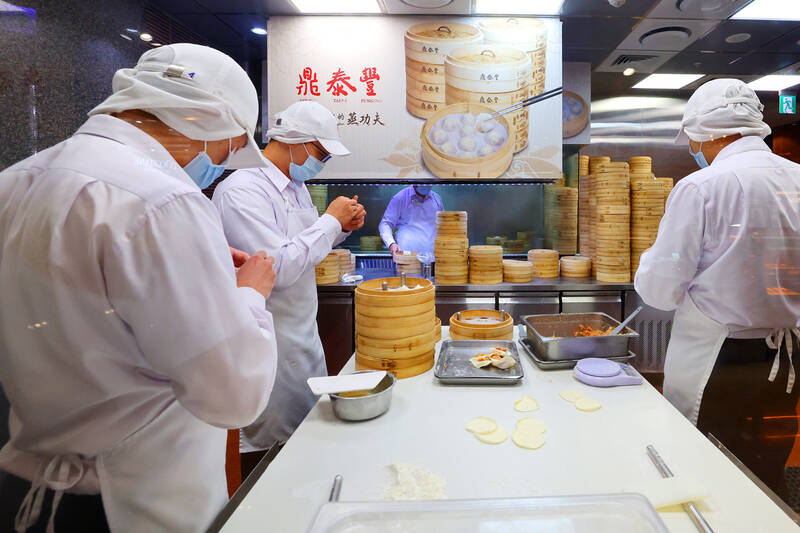The average monthly wage in June rose 3 percent from a year earlier to NT$46,486, while the average total monthly wage — including overtime pay, performance-based commissions and bonuses — gained 3.17 percent to NT$55,447, the Directorate-General of Budget, Accounting and Statistics (DGBAS) said yesterday.
The improvement mainly came from pay increases, the statistics agency said, adding that it stayed in positive territory even after factoring in inflation.
The agency said it expects the advance to be sustainable, as the nation steadily emerges from a global economic slowdown.

Photo: Lam Yik Fei, Bloomberg
Taiwan has seen real wages grow for three months in a row, indicating that people have enjoyed the benefits of economic growth, the DGBAS said.
The economy is picking up steam, after expanding 6.5 percent and 5.09 percent year-on-year in the first and second quarters respectively, it said.
With GDP forecast to grow 3.99 percent this year, Premier Cho Jung-tai (卓榮泰) last month announced plans to raise wages for government employees by 3 percent next year.
The premier urged the private sector to follow suit in raising wages.
However, employment data showed that the number of workers hired by manufacturers dropped by 2,000 in June, after ending 21 months of decline in May.
The DGBAS said that there was no need to worry about the mild retreat, as the high sales season for technology products is approaching.
A breakdown by sector showed that financial and insurance companies offered the highest average monthly wage of NT$70,741 in June, followed by video-content creators and telecom operators at NT$67,689, and electricity and gas suppliers at NT$66,911.
Nursery schools and kindergartens paid the lowest regular average wage of NT$30,323 per month, followed by restaurants and hotels at NT$34,609, and other service providers at NT$35,841, it said.
In terms of total compensation, financial and insurance companies also topped the survey at NT$90,631 a month, followed by manufacturers of computers and optical devices at NT$84,392, and electricity and gas suppliers at NT$80,077, it said.
In the first six months, regular monthly wages averaged NT$46,227 while overall compensation stood at NT$64,084, increasing 2.56 percent and 3.74 percent respectively from year-earlier levels, the agency said.
The real pace of gains tapered to 0.28 percent and 1.43 percent each after adjustments for inflation, it said.

UNCERTAINTY: Innolux activated a stringent supply chain management mechanism, as it did during the COVID-19 pandemic, to ensure optimal inventory levels for customers Flat-panel display makers AUO Corp (友達) and Innolux Corp (群創) yesterday said that about 12 to 20 percent of their display business is at risk of potential US tariffs and that they would relocate production or shipment destinations to mitigate the levies’ effects. US tariffs would have a direct impact of US$200 million on AUO’s revenue, company chairman Paul Peng (彭雙浪) told reporters on the sidelines of the Touch Taiwan trade show in Taipei yesterday. That would make up about 12 percent of the company’s overall revenue. To cope with the tariff uncertainty, AUO plans to allocate its production to manufacturing facilities in

Taiwan will prioritize the development of silicon photonics by taking advantage of its strength in the semiconductor industry to build another shield to protect the local economy, National Development Council (NDC) Minister Paul Liu (劉鏡清) said yesterday. Speaking at a meeting of the legislature’s Economics Committee, Liu said Taiwan already has the artificial intelligence (AI) industry as a shield, after the semiconductor industry, to safeguard the country, and is looking at new unique fields to build more economic shields. While Taiwan will further strengthen its existing shields, over the longer term, the country is determined to focus on such potential segments as

TAKING STOCK: A Taiwanese cookware firm in Vietnam urged customers to assess inventory or place orders early so shipments can reach the US while tariffs are paused Taiwanese businesses in Vietnam are exploring alternatives after the White House imposed a 46 percent import duty on Vietnamese goods, following US President Donald Trump’s announcement of “reciprocal” tariffs on the US’ trading partners. Lo Shih-liang (羅世良), chairman of Brico Industry Co (裕茂工業), a Taiwanese company that manufactures cast iron cookware and stove components in Vietnam, said that more than 40 percent of his business was tied to the US market, describing the constant US policy shifts as an emotional roller coaster. “I work during the day and stay up all night watching the news. I’ve been following US news until 3am

COLLABORATION: Given Taiwan’s key position in global supply chains, the US firm is discussing strategies with local partners and clients to deal with global uncertainties Advanced Micro Devices Inc (AMD) yesterday said it is meeting with local ecosystem partners, including Taiwan Semiconductor Manufacturing Co (TSMC, 台積電), to discuss strategies, including long-term manufacturing, to navigate uncertainties such as US tariffs, as Taiwan occupies an important position in global supply chains. AMD chief executive officer Lisa Su (蘇姿丰) told reporters that Taiwan is an important part of the chip designer’s ecosystem and she is discussing with partners and customers in Taiwan to forge strong collaborations on different areas during this critical period. AMD has just become the first artificial-intelligence (AI) server chip customer of TSMC to utilize its advanced